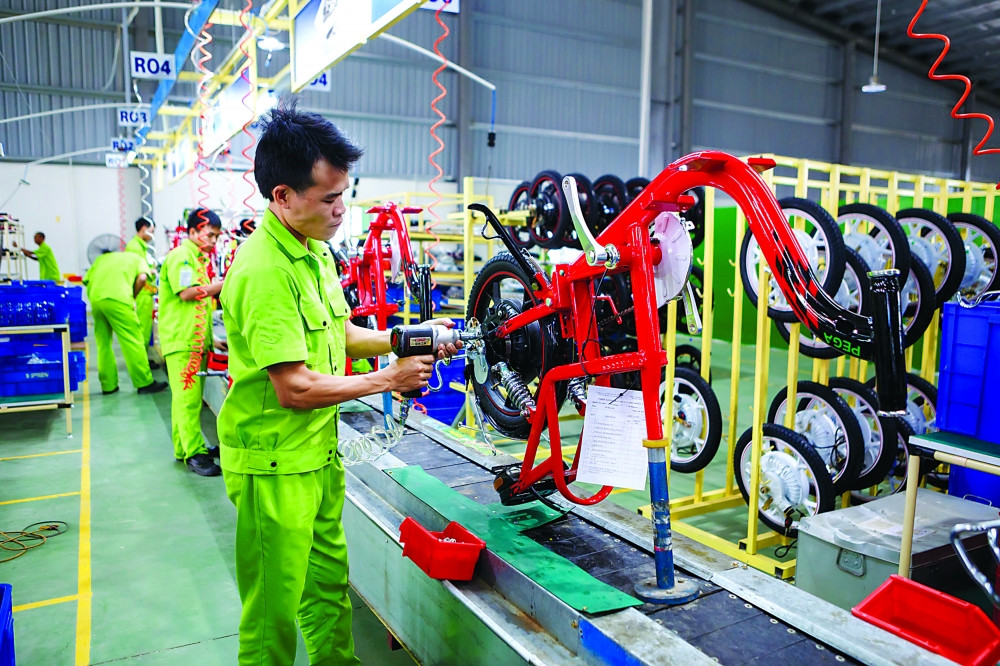
Successful year
The number of newly founded domestic and foreign businesses posted a record high in 2018, foreign direct investment (FDI) was stable and disbursed FDI capital also recorded highs.
Last year, 131,300 new enterprises totaling more than VND1,478 trillion in registered capital were established nationwide, up 3.5 percent in quantity and 14.1 percent in value from 2017, with average capital per enterprise reaching VND11.3 billion, up 10.2 percent compared to the previous year. Meanwhile, existing businesses increased their capital by almost VND2,409 trillion, taking the total to almost VND3,887 trillion in 2018. Also last year, 34,000 enterprises became operational again, up 28.6 percent from 2017 and taking the total number of newly registered enterprises and companies returning to operation to nearly 165,300.
While Vietnam attracted an additional US$35.46 billion in FDI in 2018, 98.8 percent of the 2017 level, the invested FDI capital in the country reached a record US$19.1 billion, up 9.1 percent from 2017.
Vietnam attracted several major FDI projects in 2018, including the Japanese Sumitomo Group’s US$4.14-billion smart city project in Hai Boi Commune in Hanoi’s Dong Anh District and the Republic of Korea’s Hyosung Groups’ US$1.2-billion polypropylene and liquefied petroleum gas (LPG) underground warehouse project in the southern coastal province of Ba Ria-Vung Tau.
Meanwhile, the Singaporean-funded Laguna (Vietnam) Co., Ltd. in the central province of Thua Thien Hue increased its capital by US$1.12 billion, and LG Group from the Republic of Korea increased investment capital of its Hai Phong-based LG Innitek Hai Phong and LG Display projects by a total of US$1 billion plus.

US-China trade war impact
Shi Rui Qi, Chief Representative of the Taipei Economic and Cultural Office in Vietnam, said Chinese Taipei companies have invested more than US$31.44 billion through 2,500 projects in Vietnam, taking Chinese Taipei to the fourth place among 130 countries and territories investing in the country, after the Republic of Korea, Japan and Singapore.
Shi Rui Qi said many Chinese Taipei enterprises, including enterprises that have invested in Vietnam and those that have never invested in the country, carried out market research in the country’s capital - Hanoi and the northern provinces of Bac Ninh and Vinh Phuc. Chinese Taipei businesses may move their investment from China to Vietnam as they are worried about the US-China trade war. This would considerably increase Chinese Taipei investment in Vietnam in 2019, Qi said.
Chinese Taipei enterprises choose Vietnam because Vietnam and Chinese Taipei are geographically close and culturally similar. Vietnam is an attractive destination for investors with a young population and has continually implemented investment promotion and international integration policies through bilateral and multilateral free trade agreements (FTAs), Qi said.
Chairman of the Vietnam Chamber of Commerce and Industry (VCCI), Vu Tien Loc, said at the APEC Business Forum in November 2018 in Papua New Guinea that about one-third of US businesses investing in China plan to move their investment to other countries to avoid the impact of the US-China trade war.
A 2018 report by the Japan External Trade Promotion Organization (JETRO) shows that 70 percent of Japanese enterprises operating in Vietnam said they would expand their business in the country, and they are most interested in processing, manufacturing and support industries.
This signals opportunities for Vietnam to attract FDI in 2019. Tetsu Funayama, Chairman and CEO of Mitsubishi Corporation Vietnam, said Vietnam needs to focus on developing support industries, apart from continuing to improve its investment environment, as support industries remain a major barrier to attracting quality investment projects.


















